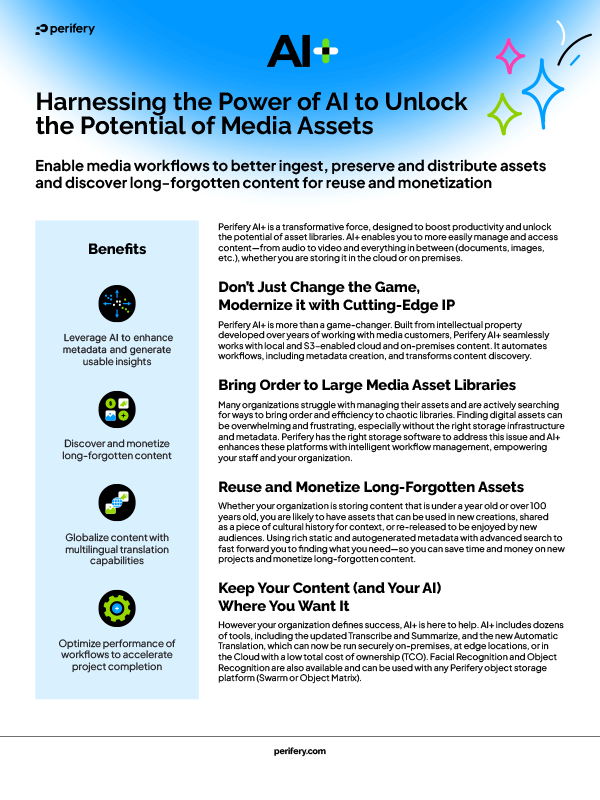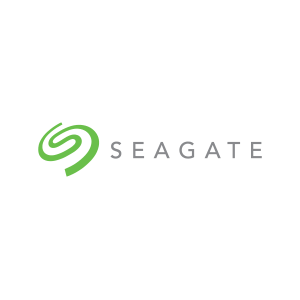Jonathan:Hello, so this is Jonathan Morgan. I am the founder of Object Matrix and CEO of Object Matrix. Object Matrix, of course, now is a part of the Perifery brand, which is part of DataCore. And in Perifery, I am the Senior Vice president of product and technology.
I'm at IBC today, and there are over 1,000 exhibitors at IBC. There's over 30,000 attenders at IBC, so a huge show for the industry. And one of the exhibitors here is Seagate and I'm really pleased to be joined today by David Thompson. David, would you like to introduce yourself?
David:Hey there Jonathan, yeah thank you. Yeah, Dave Thompson, I look after what Seagate called our systems business, which is the chassis for the drives basically, rather than just the drives themselves, but we partner with Colibri to make great solutions for our customers. But yeah, I look after the EMEA region, and yeah, enjoying the show.
Jonathan:How many shows have you been to?
David:Oh, I don't know, Jonathan, yeah, quite a few. More than ten, probably less than twenty is what I'd say and it's a good show.
Jonathan:Absolutely, and what do you say over those ten years plus the show has changed, what do you see in the show this year?
David:I think it evolves. There's new names every year here which is interesting and it's good to meet those new names and new characters. There's new technologies that come along to the show and we'll talk about some of them in a moment. But yeah, it's a great show, lots of interesting stuff.
Jonathan:Yeah, I always find the show is washed with a term. So a few years ago, there was cloud washing. If you didn't have cloud on your stand, it was almost like you were the odd one out as an exhibitor. And of late, the kind of term that you always see on people's stands is AI. And that's been a kind of a, you know, AI washing almost. if your product is AI or not. If you don't have AI on your stand, you're almost at a loss. I think I've seen a lot of AI at the show. I've seen it in relation to Seagate products, for instance. So how does that relate in reality to Seagate?
David:I think, I mean, both terms, actually. We've got both terms on our stand, for sure, right? As have perifery, really. And we embrace, new technologies, we're certainly embracing AI as we have already embraced cloud. So, you know we've got AI within our drives and its a great draw as you say you know you get lost in terms, it's a great term to hear at IBC this year.
Jonathan:But there is a reality right that AI generates data and lots of data and that is where Seagate come in and just that sheer generation, how do I handle this and where do I handle that data comes into the story.
David:Absolutely, well data growth at the moment is exponential and it is never ceasing. Every year more and more data is generated, some of it is stored, a lot of it isn't stored and where Seagate come into that is we aim to enable that storage more completely, more and more, as we can.
Jonathan:I understand. Now AI at the Edge is something that Perifery talk about. And again, that's talking about data gravity. It's talking about let's process the data where it lives. Let's not move all of the data because if you do, then there might be too much of it. And with all of the cameras, with all of the coverage, with all of the format changes which go increasingly towards 8K and even beyond at times, there's just too much data to be processed in the cloud because getting it there is expensive and then perhaps processing it there is expensive and sometimes being able to do that in facility or at the edge can be a big benefit so that's one of the things obviously I'm keenly looking at that because that's what periphery are doing. But that's something that you have in the Seagate world as well.
David:It is yes, we're completely aligned with that. We see lots and lots of data creation at the edge, especially at the moment, especially in this industry. And to be able to work with Perifery to kind of help solve and manage that data in that environment and then move it to the right environment is invaluable.
Jonathan:Yeah, I mean, we've seen a massive interest in that area. For Perifery, object storage is the natural place to keep data. It's the natural place to keep data because it scales, it's secure, it has an S3 API, which nearly every product, let's face it, works with these days. And it enables the data to be handled in a clean way, a transportable way, if you like, as it moves from edge to on-facility, to the cloud, and back again, separating the metadata from the data, being able to move that around. Yeah, no, IBC for me, it's very busy. There's lots of new technology, and it all wants to live in this world of edge to core to cloud to core to another cloud or wherever that data is going.
David, we have announced, well we've been saying a new partnership with Seagate between Perifery and Seagate, but actually you made a very valid point on this, so would you like to explain?
David:Absolutely, we value our relationship with Perifery and we also value our relationship with DataCore. So in theory the periphery relationship is relatively new, you know a number of months etc. But to be fair we've been working with DataCore for many years and had a really close relationship and lots of joint success in the marketplace. In all sorts of marketplaces, M&E is one of them, but others as well.
Jonathan:And that's been working with them on the sports side, on the sales side, on the marketing side. How has that worked?
David:In each region, so we've got joint partners, which is great. We've got complementary products. You know, one product obviously helps the other product to evolve in the marketplace. We've certainly done joint marketing. We've done qualifications between us as companies. I mean, you've qualified just recently our latest products.
Jonathan:Yeah, I mean the new relationship, if I can call it that, in terms of the Seagate plus Swarm, Seagate plus Object Matrix, which are both object storage technologies. This is very much based on both the XSAP platform and the Corvault platform. What are the features of Corvault that are great for object storage?
David:There's several actually. We've got some very, very unique technologies within Corvault. So, Corvault's Seagate's identity data storage platform, it starts at 1.5 petabytes and scales from there, so we've got two petabyte solutions, et cetera. But there's a couple of very unique attributes that it has which really helps in this sort of environment. The first one is the way that we create our volumes. We use a technology called ADAPT. And what ADAPT enables in essence is much, much faster rebuilds. As drives have got bigger, rebuild times have extended and they've extended to a point where a lot of our customers think they're unacceptable, maybe a week or more for a traditional. However, with ADAPT we can bring those rebuilt times down to under a day, and if it's critical, they're under an hour, so we're coming back to safety very, very quickly. And that's coupled with a second technology which is unique to Seagate, and certainly helps our partnership and our customers, which we call ADR. And ADR is where we can, in the device, repair or adjust if our drive fails or does not fail at the end of the day, we can identify a problem within the drive and eliminate that problem and reintroduce that drive into the system without an engineer or without an outsider in the system, meaning that it is self-healing at the end of the day, which is very useful.
Jonathan:Absolutely, the data preservation abilities, if you like, of Corvault mixed with object storage which can do replication, can do cross-node erasure coding alongside of the Corvault erasure coding which can be within a node are very strong indeed and they're very complementary to each other. If you like, Corvault naturally belongs together with object storage.
David:I agree. I think it's very compelling. It's very compelling.
Jonathan:Another great thing about object storage of course is the immutability of objects at times if you wish them to be immutable, which is complete protection against ransomware. But there's another really key feature from Corvault that's built into the Corvault platform around security.
David:Yeah, our drives are encrypted by default, so all of our Corvault series is one of the things that's natural to it. Run either SED or FIPS drives so the solution is encrypted from day one.
Jonathan:This is really important because what this does by having the encryption at the, if I can be so blasé to say hardware layer, having the encryption at that level of the Corvault means that you don't need to do the encryption at the object storage layer which can reduce the CPU load required or the CPU configuration that is required by up to 40%. in terms of the hardware there. So, what you're doing by doing that is bringing down the cost of the service that you are required, significantly, you're speeding up the processing of the data or the transfer of the data onto the storage, having guarantees at a really fundamental level about the security at multiple layers. Put that all together and you reduce costs, you reduce even the environmental impact, and you get excellent performance throughout.
David:I couldn't agree more.
Jonathan:I feel like I'm going into salesman mode. But as a technologist sometimes something just makes sense and then that sells itself.
David:Absolutely. And we begin to help the customers save some money at the end of the day and those sort of technologies, encryption, offloading, load from the host side of things, is always important and actually with Corvault in particular, alongside the encryption, the fact that we manage all the drives independently and provide the provide lums up to the host instead of providing hundreds of drives to the host we're just providing a couple of lums that also reduces load within the host environment and also network traffic, which speeds everything up to the end of the day and reduces the server costs. So, with Perifery and the S3 manageability of it, it really is a good story.
Jonathan:They're brilliant for each other, I believe that very much. David, any closing words?
David:No, no closing words. What a fantastic show. And it's great to be here today on the Perifery stand working with Jonathan and talking to our customers together. Fantastic, thank you.
Jonathan:Thank you very much, David.

